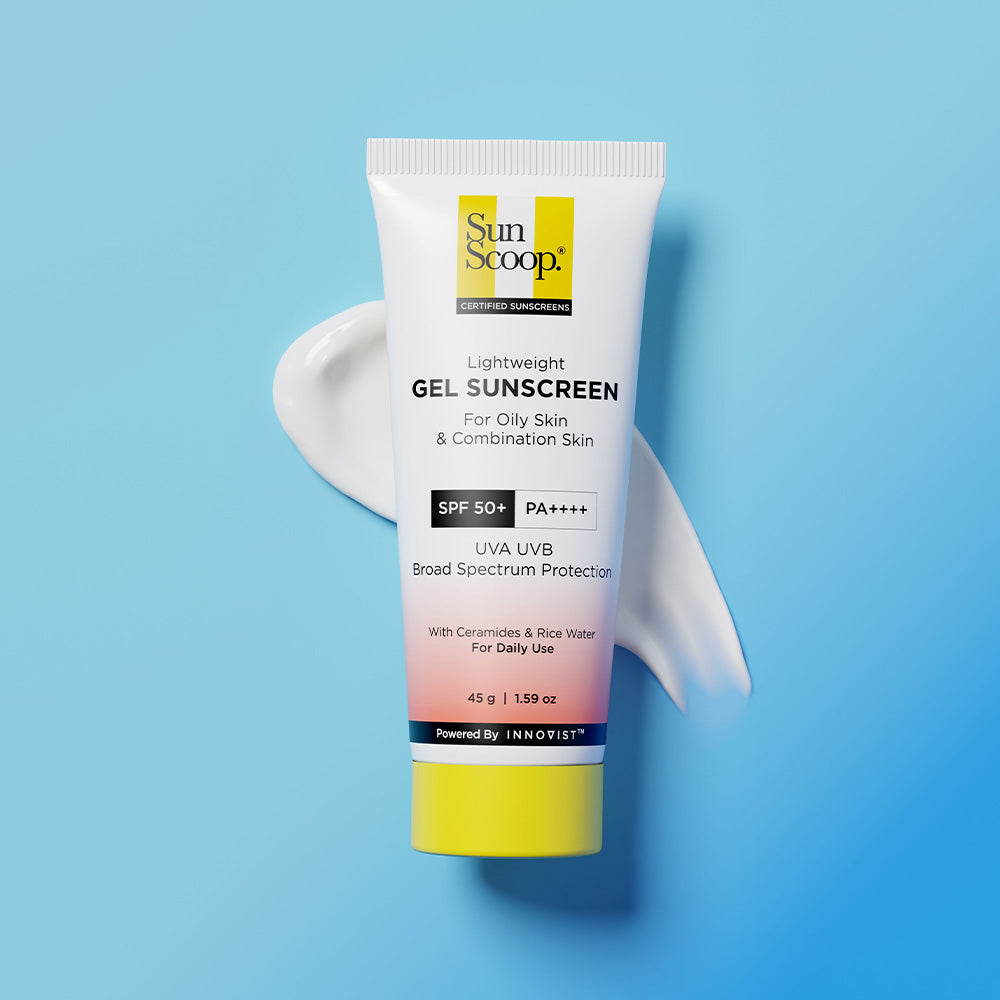Higher the SPF, Better the Sunscreen. That's a Myth!
30 Second Digest
-
SPF measures sunscreen protection from UVB rays
-
SPF doesn’t measure protection from UVA rays
-
A higher SPF doesn’t necessarily indicate better protection
-
Broad spectrum high SPF sunscreens are the best
-
No sunscreen is truly waterproof
-
People of all ethnicities need sunscreen with high SPF
-
SPF sunscreens are safe to use for adults
-
Most people under apply sunscreens
Introduction On What is SPF
What is SPF and why is it such a “hot” topic in beauty circles? SPF stands for “Sun Protection Factor,” and it is a measure of how much protection a sunscreen product gives to our skin. Long-time exposure to the sun can lead to tanning, premature ageing, sunburns, and even skin cancer in extreme cases. That is why using a good SPF sunscreen before venturing out in the sun is so important. Talking of SPF, people often wonder what SPF numbers indicate. Here is all you need to know about SPF.
What is SPF and why is it important?

SPF or Sun Protection Factor is a relative measurement of a sunscreen product’s ability to protect your skin from the damaging effects of UVB radiation. It is an important factor to consider when buying sunscreen.
UVB rays emitted by the sun can cause sunburns and has a big role to play in the development of skin cancer. These rays primarily affect the epidermis, the outer layer of the skin. The sun also emits UVA rays which can also harm the skin. However, SPF numbers typically measure a sunscreen’s ability to offer UVB protection only.
Now, one might ask what is SPF 15 or SPF 30? How are they different, and which one is better?

What do SPF numbers mean?
The SPF numbers on bottles of sunscreen lotions can be very confusing. What do these numbers mean and which SPF number is the best for you? An SPF number is an indication of how much protection a sunscreen product can provide your skin.
A product with SPF 15 blocks 93% of the sun’s UVB rays while SPF 30 sunscreen blocks 97%. SPF 50 blocks 98% of UVB rays and SPF 100 blocks 99% (1). No sunscreen can offer you 100% protection from UVB rays.

Is a higher SPF always better?
People mistakenly believe a sunscreen with a higher SPF is always better. However, it is not so. Under ideal conditions, a sunscreen product with a higher SPF offers more protection against UVB rays than other products with lower SPF values. But practically speaking, the protection offered increases only marginally with higher SPF values.
Dermatologists generally recommend using a sunscreen product with at least SPF 30 for optimum benefits. SunScoop products offer SPF 40 and higher. The amount of sunscreen you apply also determines how much you are protected. There is very little difference between the best protection offered by medium and high SPF products (2).

How to choose the best SPF for my skin?
Dermatologists recommend going for a sunscreen with SPF 30 or more. It is better to go for products that offer broad spectrum protection (like SunScoop) and are water-resistant. Apply sunscreen 15 minutes before going out and reapply approximately every two hours.
In closing thoughts, what is SPF?

Wearing a sunscreen with an adequate SPF all the time is a necessary step in skincare. Exposing unprotected skin to the harmful UV rays of the sun can not only lead to tanning and sunburn but can also increase your risk of skin cancer.
Choose a product with at least SPF of 30 for outdoor use. Those who spend a lot of time in the sun can benefit from using SPF 40 or SPF 50 like the SunScoop sunscreens. Visit India’s first SPF-focused brand, SunScoop, to explore a wide range of sunscreen products for your skin.
Most asked questions on what is SPF
-
What does SPF mean?
SPF means “Sun Protection Factor,” and it is a measure of how much protection a particular sunscreen product can give your skin.
-
Is SPF 30 or 50 better?
A sunscreen with SPF 50 provides marginally better protection from UV radiation than a sunscreen with SPF 30, so take your pick!
-
Which SPF should I use?
It is recommended that you use a sunscreen with an SPF of at least 30, which blocks 97% of UVB rays.Is SPF 100 better?
A sunscreen with SPF 100 blocks about 99% of UVB rays. It is only marginally better than sunscreens with SPF 50 or SPF 70.
-
Is SPF 50 or SPF 70 better?
A sunscreen with SPF 70 offers only marginally better protection than a sunscreen with SPF 50. So, it’s entirely your choice to choose either.
-
Is SPF 30 good for the face?
Yes, SPF 30 is good for the face. Dermatologists generally recommend using sunscreen with an SPF of at least 30 on the face and body.
-
Which SPF is best for the face?
Any sunscreen with an SPF of at least 30 is good for the face. You can use sunscreen with a higher SPF if you wish to.
-
Is SPF 15 good?
If you are spending most of your time indoors, then a sunscreen with SPF 15 may be sufficient for you. However, it is not enough to protect you if you go outside in the sun.
-
Is SPF 15 sunscreen better than 30?
A sunscreen with SPF 15 can provide adequate protection only indoors. A sunscreen with SPF 30 is better for outdoor use.
-
What does an SPF of 15 mean?
A sunscreen with SPF 15 blocks 93% of UVB rays.
-
Is SPF 30 good enough for your face?
Yes, SPF 30 is good enough for your face.
-
Should I use SPF 50 on my face?
Dermatologists suggest using sunscreen with at least SPF 30 on your face. You can choose to use SPF 50 if you wish to.
References
https://www.skincancer.org/blog/ask-the-expert-does-a-high-spf-protect-my-skin-better/
https://www.aad.org/public/everyday-care/sun-protection/sunscreen-patients/sunscreen-faqs
FAQs
The 5 steps to sun safety are:
1. Apply sunscreen.
2. Wear protective clothing.
3. Stay under shade during peak hours (10:00a.m. to 04:00p.m.)
4. Stay hydrated.
5. Don't forget to reapply the sunscreen.
Follow these tips for being in the sun:
1. Apply broad-spectrum sunscreen with SPF 30 or higher.
2. Choose long sleeves, hats, and UV-blocking sunglasses.
3. Drink plenty of water to prevent dehydration.
4. Reapply every two hours or after swimming or sweating.
5. Limit sun exposure between 10 a.m. and 4 p.m.
To apply sunscreen correctly, use a generous amount and cover all exposed skin, including often-missed areas like the ears, back of the neck, and tops of the feet. Apply it at least 15 minutes before sun exposure, and reapply every two hours or immediately after swimming or sweating.
The 5 W's of sunscreen are:
1. Who: Everyone, regardless of age or skin type, should use sunscreen.
2. What: Use a broad-spectrum sunscreen with at least SPF 30.
3. When: Apply sunscreen 15 minutes before sun exposure and reapply every two hours or after swimming or sweating.
4. Where: Apply to all exposed skin, including face, neck, ears, and the tops of feet.
5. Why: To protect against harmful UV rays, prevent sunburn, reduce the risk of skin cancer, and prevent premature aging.
The 3 finger rule in sunscreen means you need to squeeze sunscreen on your three fingers and then apply it thoroughly on your face. This ensure that you are applying the right quantity.
Look for these criterias while choosing the perfect sunscreen:
1: SPF Level: Select SPF 30 or higher for adequate protection.
2. Broad Spectrum: Ensure it protects against both UVA and UVB rays.
3. Skin Type: Choose a formulation suited to your skin type (e.g., sensitive, oily).
4. Water Resistance: Opt for water-resistant sunscreen if swimming or sweating.
5. Non-Comedogenic: Especially for acne-prone skin to avoid clogging pores.
Yes, it is an excellent choice to wear sunscreen on face everyday to protect your skin from harmful UV rays and other signs of ageing.
Yes, sunscreen helps protect your face from harmful UV rays, preventing sunburn, premature ageing, and reducing the risk of skin cancer.
Here are the benefits of sunscreen:
1. Protection from UV rays.
2. Prevents sunburn.
3. Anti-ageing.
4. Skin cancer prevention.
5. Maintains skin tone.
Yes, babies need sunscreen, but it's important to use specially formulated sunscreen designed for infants over 6 months old. Always consult with a pediatrician before applying sunscreen to babies, and keep them protected with hats, clothing, and shade whenever possible.
Here are the best sunscreen ingredients to look for:
1. Mineral Sunscreens: Zinc oxide and titanium dioxide provide broad-spectrum protection and are gentle on sensitive skin.
2. Chemical Filters: Avobenzone, octinoxate, octisalate, and octocrylene offer effective UV protection in chemical sunscreen formulations.
3. Broad-Spectrum Coverage: Ensure the sunscreen protects against both UVA and UVB rays for comprehensive sun protection.
More Related Terms
Sun Care Tips | Sunscreen Secrets | Spf60 sunscreen | Body Suncare | Sunscreen Spray









